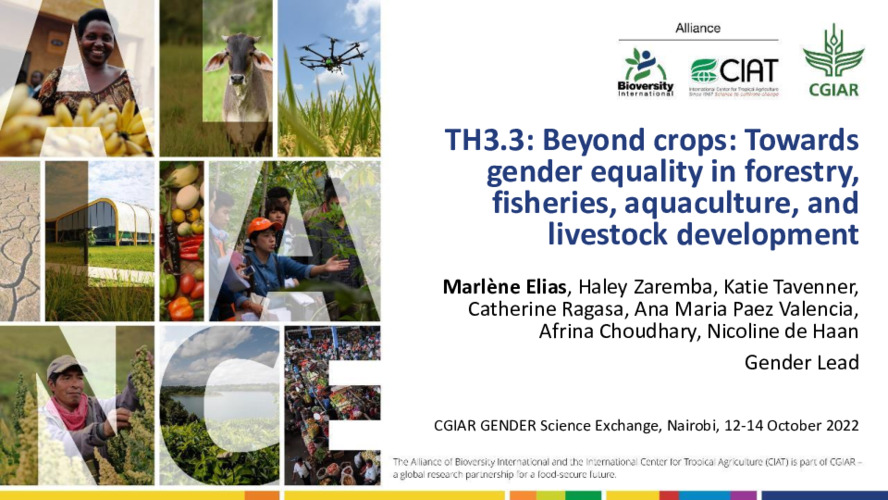Please use this identifier to cite or link to this item:
https://hdl.handle.net/20.500.12348/5522
Beyond crops: Towards gender equality in forestry, fisheries, aquaculture, and livestock development
| dc.creator | Elias, M. | en_US |
| dc.creator | Zaremba, H. | en_US |
| dc.creator | Tavenner, K. | en_US |
| dc.creator | Ragasa, C. | en_US |
| dc.creator | Valencia, A.P. | en_US |
| dc.creator | Choudhury, A. | en_US |
| dc.creator | De Haan, N. | en_US |
| dc.date.accessioned | 2023-06-10T14:42:39Z | |
| dc.date.available | 2023-06-10T14:42:39Z | |
| dc.date.issued | 2022 | en_US |
| dc.identifier.citation | Marlene Elias, Haley Zaremba, Katie Tavenner, Catherine Ragasa, Ana Maria Valencia, Afrina Choudhury, Nicoline De Haan. (14/11/2022). Beyond crops: Towards gender equality in forestry, fisheries, aquaculture, and livestock development. Rome, Italy: Alliance Bioversity International-International Center for Tropical Agriculture (ABC). | en_US |
| dc.identifier.uri | https://hdl.handle.net/20.500.12348/5522 | |
| dc.description.abstract | The fisheries, aquaculture, forestry, and livestock sectors are critical for sustaining rural livelihoods and achieving global food and nutrition security. Yet each of these sectors embeds important gender and other social inequalities, hindering people who rely on these livelihood systems from achieving their full potential. In this background paper for the Report on The Status of Rural Women in Agri-food Systems: 10 Years after the SOFA 2010-11, we review the literature to examine gender gaps in relation to each sector, their implications for achieving multiple food system outcomes, what has worked to reduce inequalities, and the potential these sectors hold for advancing gender equality as an outcome in itself. We demonstrate that, despite specificities across sectors, similar gender barriers limit the benefits women receive from fisheries, aquaculture, forestry, and livestock. These constraints, which occur at multiple levels, include: the invisibility and undervaluation of rural women's labor and their disproportionately heavy labor burdens, limited and precarious control over resources, norms that hinder women's voice and influence in decision-making and governance, and exclusionary institutions such as resource-user groups and extension and data systems. Drawing on Njuki et al.'s (2021) Gendered Food Systems framework, we demonstrate that, to achieve transformative change in food systems, changes in each sector are required in women's agency, access to and control over resources, gender norms, and policies and governance. Such changes can improve dietary outcomes, gender equality and women's empowerment, economic and livelihood outcomes, and environmental outcomes. To conclude, we argue that closing gender gaps across sectors requires multipronged strategies that simultaneously engage these four change pathways to lift structural barriers to inequality. | en_US |
| dc.format | en_US | |
| dc.language | en | en_US |
| dc.publisher | Alliance Bioversity International-International Center for Tropical Agriculture (ABC) | en_US |
| dc.rights | CC-BY-NC-4.0 | en_US |
| dc.subject | gender equality, youth and social inclusion | en_US |
| dc.title | Beyond crops: Towards gender equality in forestry, fisheries, aquaculture, and livestock development | en_US |
| dc.type | Presentation | en_US |
| cg.subject.agrovoc | agriculture | en_US |
| cg.subject.agrovoc | gender | en_US |
| cg.subject.agrovoc | livelihoods | en_US |
| cg.contributor.affiliation | International Center for Tropical Agriculture | en_US |
| cg.contributor.affiliation | International Food Policy Research Institute | en_US |
| cg.contributor.affiliation | International Livestock Research Institute | en_US |
| cg.contributor.affiliation | World Agroforestry Center | en_US |
| cg.contributor.affiliation | WorldFish | en_US |
| cg.contributor.affiliation | Alliance Bioversity International-International Center for Tropical Agriculture | en_US |
| cg.contributor.affiliation | CGIAR Gender Platform | en_US |
| cg.identifier.status | Open access | en_US |
| cg.contribution.worldfishauthor | Choudhury, A. | en_US |
| cg.description.theme | Gender | en_US |
| cg.identifier.url | https://cgspace.cgiar.org/handle/10568/125598 | en_US |
| cg.creator.id | Marlene Elias: 0000-0001-8835-5348 | en_US |
| cg.creator.id | Afrina Choudhury: 0000-0003-1734-6238 | en_US |
| cg.creator.id | Nicoline De Haan: 0000-0002-6392-7079 | en_US |
Files in this item
This item appears in the following Collection(s)
-
Gender [323]
